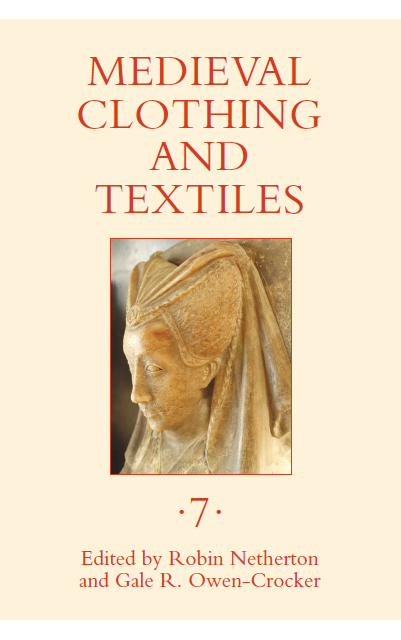Book contents
- Frontmatter
- Contents
- Illustrations
- Tables
- Contributors
- Preface
- The Empress’s New Clothes: A Rotulus Pannorum of Isabella, Sister of King Henry III, Bride of Emperor Frederick II
- Unveiling Social Fashion Patterns: A Case Study of Frilled Veils in the Low Countries (1200–1500)
- What Is the Pearl-Maiden Wearing, and Why?
- “Hys surcote was ouert”: The “Open Surcoat” in Late Medieval British Texts
- London Merchants’ Cloth Exports, 1350–1500
- Laboreria Sete: Design and Production of Lucchese Silks in the Late Fourteenth and Early Fifteenth Centuries
- Recent Books of Interest
- Contents of Previous Volumes
London Merchants’ Cloth Exports, 1350–1500
Published online by Cambridge University Press: 18 February 2023
- Frontmatter
- Contents
- Illustrations
- Tables
- Contributors
- Preface
- The Empress’s New Clothes: A Rotulus Pannorum of Isabella, Sister of King Henry III, Bride of Emperor Frederick II
- Unveiling Social Fashion Patterns: A Case Study of Frilled Veils in the Low Countries (1200–1500)
- What Is the Pearl-Maiden Wearing, and Why?
- “Hys surcote was ouert”: The “Open Surcoat” in Late Medieval British Texts
- London Merchants’ Cloth Exports, 1350–1500
- Laboreria Sete: Design and Production of Lucchese Silks in the Late Fourteenth and Early Fifteenth Centuries
- Recent Books of Interest
- Contents of Previous Volumes
Summary
English woollen cloth exports rose dramatically from the mid-fourteenth to the beginning of the sixteenth century, as did London’s share of those exports. In the year that the Black Death reached England, 1348–49, London exported only 217 cloths, 12.5 percent of the national total of 1,734 cloths. By the first decade of the fifteenth century, London’s cloth exports had grown to 13,921 annually, 42 percent of national exports of 33,158 equivalent assize broadcloths; and a century later, 49,500 cloths were shipped from London annually, 61.1 percent of the 81,037 cloths shipped nationally. (See table 5.1 for cloth exports nationally and for London from 1347, when records of denizen cloth exports began, until 1510.) Exports were to continue to surge until the mid-sixteenth century, peaking at 150,563 cloths in 1553, by which time London’s share of exports was 90 percent. London merchants competed for this trade with Hanseatic and other alien merchants, mostly Italian. The share of London’s trade held by its own merchants, although fluctuating, averaged around 40 percent for much of the fifteenth century. During this period, England changed from being a supplier of wools to the Continental cloth industry to being the leading manufacturer of woollen cloth in Europe. It was in the 1430s that the amount of wool exported in the form of cloth exceeded that shipped as woolsacks.
This paper traces London’s trajectory in the cloth trade from the perspective of the craft affiliations of the London merchants who shipped the cloth. Growth of cloth exports was accompanied by an increased specialization in the marketing of English cloth, and the Mercers’ Company and the Drapers’ Company were the two guilds that most successfully adjusted to the needs of the market, and appear to have been the most entrepreneurial during this period. Success as a cloth merchant, therefore, came to depend on company membership. The cloth trade was influenced by a number of factors that changed over time. In the fourteenth century, leading merchants were more concerned with raw wool than cloth, and with the products they imported rather than the cloth they exported. Each merchant company tended to focus its activities on specific Continental markets that provided it with the key products of its trade.
- Type
- Chapter
- Information
- Medieval Clothing and Textiles 7 , pp. 111 - 140Publisher: Boydell & BrewerPrint publication year: 2011
- 1
- Cited by

